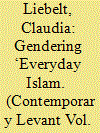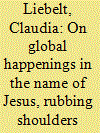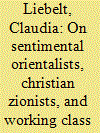|
|
|
Sort Order |
|
|
|
Items / Page
|
|
|
|
|
|
|
| Srl | Item |
| 1 |
ID:
160374


|
|
|
|
|
| Summary/Abstract |
In this introductory paper, we contribute to the important debate on 'Everyday Islam' by thinking about ways in which the everyday constitutes a useful analytical category in relation to Islam, not in contrast to studies of Islamic piety and normativity, but as co-constituted with (Islamic) morality. Secondly, drawing on a feminist critique in anthropology that is intricately linked to the discussion of the everyday in the wider Mediterranean, we seek to insert 'gender' as an analytical category into the debate on everyday Islam and quotidian life in the region, focusing on norms of femininity and the particular experiences of women. The focus on women, we argue, is especially suited to analyse the gendered dynamics in Muslim-majority societies and indeed an almost revolutionary process within Islam in recent years, namely that of women becoming knowledgeable, self-reflective and 'literate' in reference to the hermeneutics and rhetorics of Islamic texts.
|
|
|
|
|
|
|
|
|
|
|
|
|
|
|
|
| 2 |
ID:
106073


|
|
|
| 3 |
ID:
084438


|
|
|
|
|
| Publication |
2008.
|
| Summary/Abstract |
Within a global gendered economy based on an international division of labor, Filipina migrants have become nannies, maids, and caregivers in affluent homes in numerous Asian and Middle Eastern countries. Filipina migrants who seek employment as domestic workers abroad have been described as "classical" transmigrants who keep in touch with family members back home and commute between their countries of origin and their destinations. In this article - based on ethnographic research in Israel, Palestine, and the Philippines between 2003 and 2008-the author argues that Filipina migrants are transnational in a much broader sense than commonly discussed in studies on migration: engaged in border-cross-ing journeys through a number of nation states, many Filipina migrants move on and on rather than back and forth. They do so within a global hierarchy of desirable destination countries, ranked according to the differences between nation-states with regard to salaries and the legal entitlements migrants can claim, the costs and risks migrants have to take in order to enter, and these countries' overall subjective and imaginative attractiveness. By migrating on, Filipina domestic workers acquire an intimate picture of the Middle East "backstage." Some even become self-pro-claimed Middle Eastern experts or politically active Christian Zionists or sentimental Orientalists, who, in spite of their Christianity, miss fasting on Yom Kippur or during Ramadan as they continue their journeys toward Western Europe and North America, where they have hopes of living and perhaps gaining citizenship
|
|
|
|
|
|
|
|
|
|
|
|
|
|
|
|
|
|
|
|
|